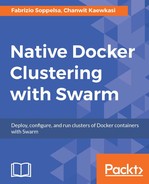There are many reasons to use a clustering solution for your containers. As you will see your applications growing, you will face new mandatory requirements, such as scalability, manageability, and high availability.
There are many tools available out there; picking up Docker Swarm gives us some immediate advantages:
- Native clustering: Swarm is a native in Docker and made by the Docker team and community. Its original creators are Andrea Luzzardi and Victor Vieux, who are the early implementers of Docker Engine Remote API itself. Swarm integrates, with no additional requirements, with Machine, Compose, and the other tools from the ecosystem.
- Production grade: Swarm v1 was declared mature in November 2015 and is ready to be used in production. The team already demonstrated that Swarm can scale-up to control Engines that are as large as 1,000 nodes. Swarm v2 allows forming clusters with multi-thousand nodes, as it uses a decentralized discovery.
- Work out-of-the-box: Swarm does not require you to re-architect your app to adapt to another orchestration tool. You can use your Docker images and configurations with no changes and deploy them at a scale.
- Easy to setup and use: Swarm is easy to operate. Effective deployments can be done by just adding some flags to Machine commands or using Docker commands since Docker 1.12. Discovery service is integrated into Swarm Mode, making it quick to install: There is no need to set up external Consul, Etcd, or Zookeeper clusters.
- Active community: Swarm is a vibrant project, with a very active community and is under heavy development.
- Available on Hub: You don't need to install Swarm, it comes ready as a Docker image (Swarm v1), and so you just pull and run it from the Hub or integrated into the Docker Engine. While Swarm Mode is already integrated into Docker 1.12+. That's all.
..................Content has been hidden....................
You can't read the all page of ebook, please click here login for view all page.
